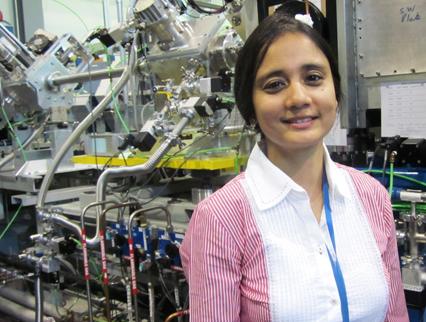
News Release | For Immediate Release
New Research Initiative May Help Cancer Fight and a Better Understanding of the Origins of the Universe
Dr. Rituparna Kanungo's newest research collaboration has some lofty goals: improve cancer research, stimulate the manufacturing of high-tech Canadian-made instrumentation and help explain the origin of the cosmos.
The Saint Mary's nuclear physicist's goal moved one step closer to reality today when the federal government announced $1.6 million in support for an advanced research facility that will allow her to recreate, purify, and condition rare isotopes that haven't existed on the planet for millions of years.
The federal fiscal support from the Canada Foundation for Innovation together with additional provincial and private sector investment will allow the $4.5 million project to be operational in 2015.
"The facility will dramatically advance Canada's capabilities for isolating, purifying, and studying short-lived isotopes that hold the key not only for understanding the rules that govern the basic ingredients of our everyday lives but also for crafting new therapies that could target and annihilate cancers cell-by-cell within the human body, " said Dr Kanungo.
The CANadian Rare-isotope facility with Electron-Beam ion source (CANREB) project is led by Saint Mary's University partnering with the University of Manitoba and Advanced Applied Physics Solutions, Inc. in collaboration with the University of British Columbia, the University of Guelph, Simon Fraser University, and TRIUMF. TRIUMF is Canada's national laboratory for particle and nuclear physics. It is owned and operated as a joint venture by a consortium of Canadian universities that includes Saint Mary's University.
The CFI funding helps to build the bridge across Canada for knowledge and skills development, joining expert hands from coast to coast.
As one of the nation's top nuclear researchers (she was one of only two Canadians invited to speak at a Nobel Symposium last June about exotic isotopes), Dr. Kanungo has been conducting research at the TRIUMF facility for many years, carrying out analyses from her office at Saint Mary's University together with teams of students. Her students also often spend semesters at the Vancouver facility.
As the project leader for the new initiative, she said TRIUMF is the ideal location because of its world leading isotope-production capabilities and its ability to produce clean, precise, controlled beams of selected exotic isotopes not readily available anywhere else in the world.
In recent studies in the U.S., some of these isotopes have been shown to have dramatic impact in treating types of cancer, by delivering radioactive payloads directly to the cancerous cells. Canada's mastery of the technology to isolate, study, and control these isotopes will change the course of healthcare.
An integral part of the project is the creation of a new generation of high resolution spectrometer using precision magnets. Advanced Cyclotron Systems, Inc. a company in British Columbia, has been selected for the work with the hope that the expertise it develops during the venture will empower it to design and build precision-magnet technology products for cutting-edge projects all around the world.
"Research and innovation is a forceful driver of growth in our communities," said Gilles G. Patry, president and CEO of the Canada Foundation for Innovation. "Today's funding will allow a talented group of researchers and students to create the solutions, products and ideas Canada needs to prosper."
-- from a Saint Mary's University press release
